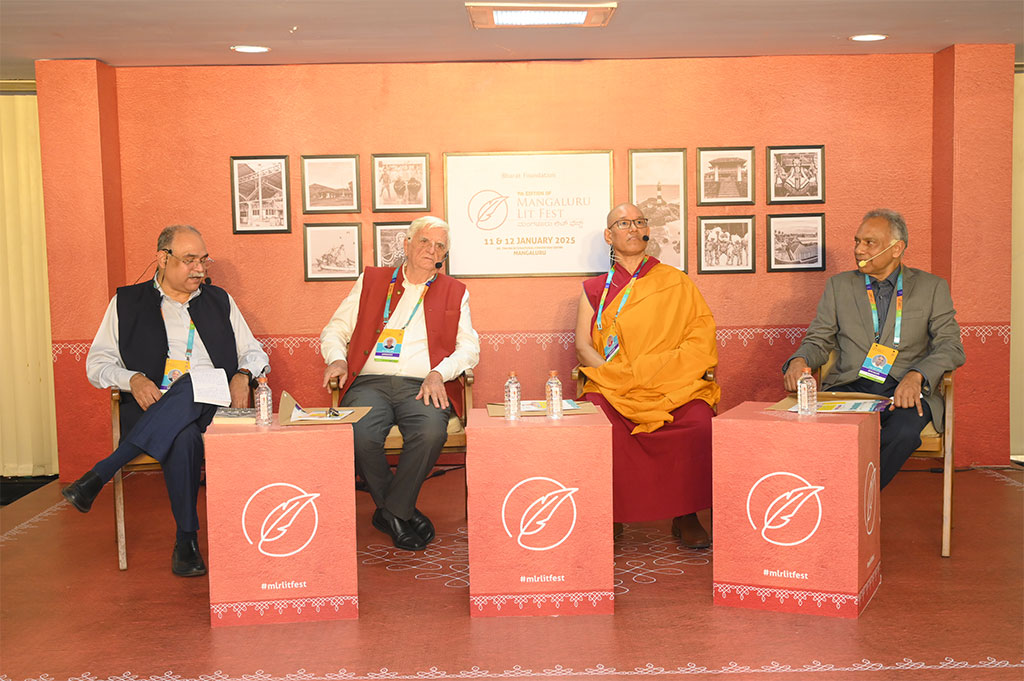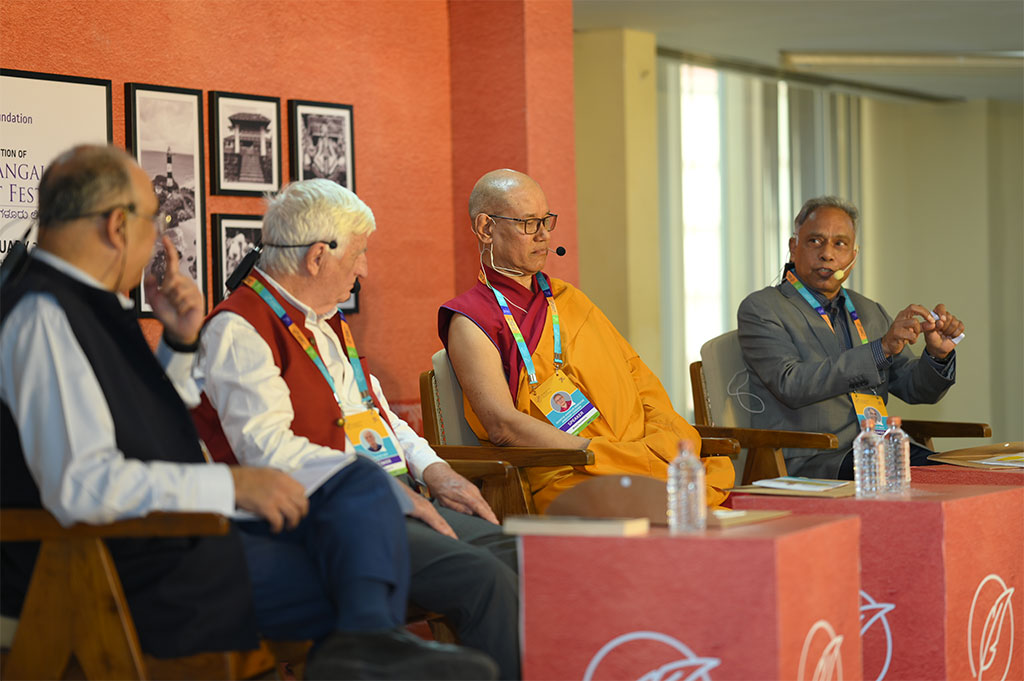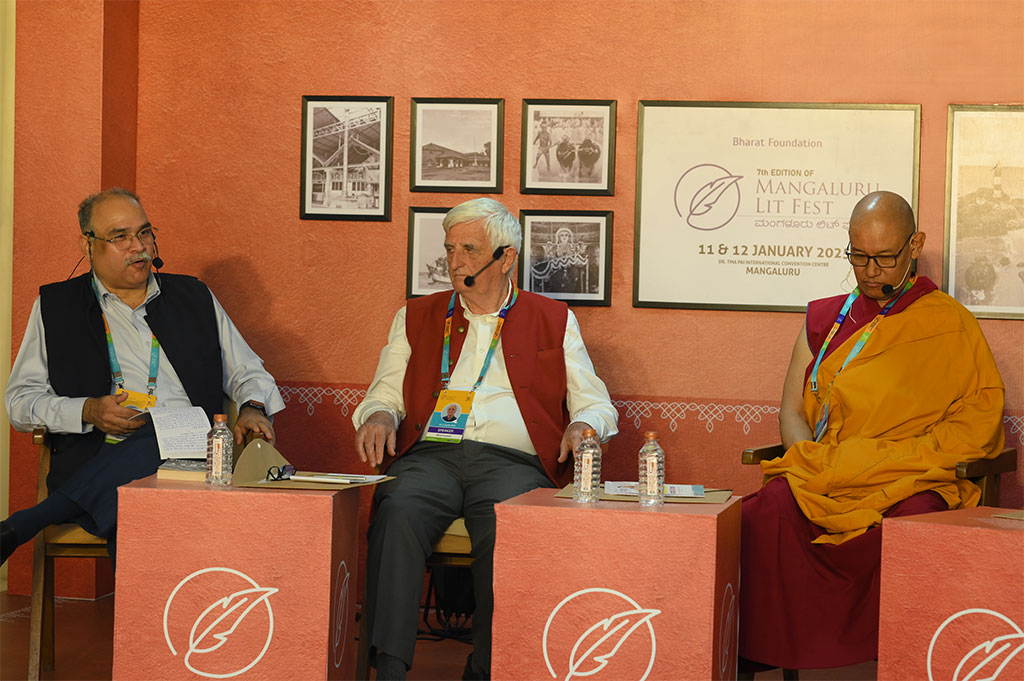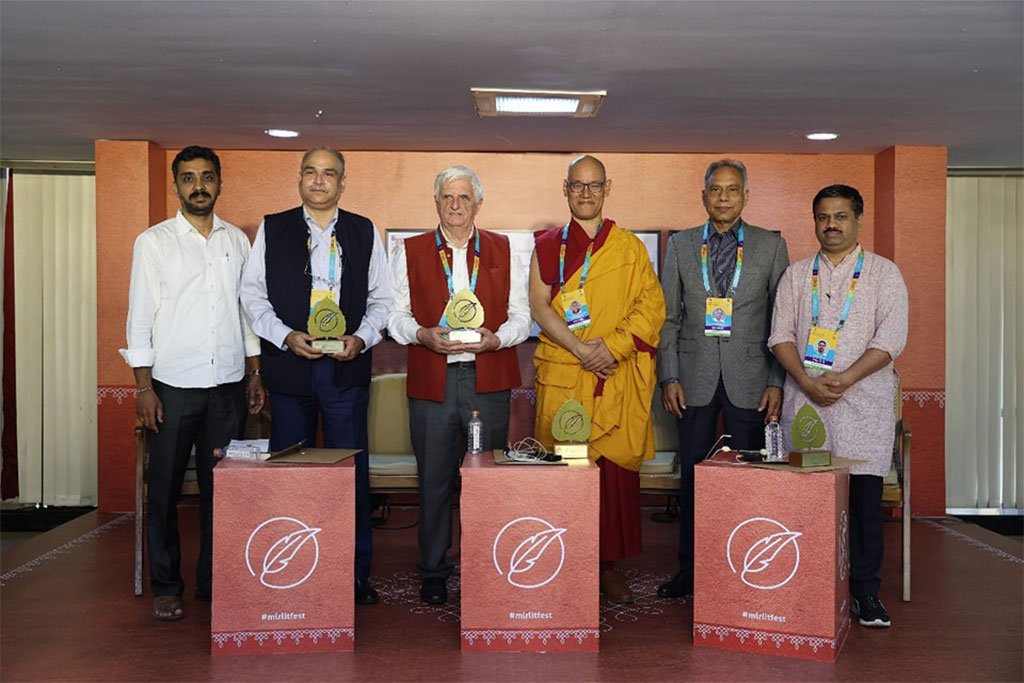Day 2 | Audi 2 – Session 1 : 10.15 am
Dr. Claude Arpi, Amb. Dilip Sinha, Jangchup Choeden and Bipindra N. C.
The session titled “Himalayan Geopolitics”, delved into the complex dynamics shaping the geopolitical landscape of the Himalayan region, featuring a diverse panel of experts. Moderated by Bipindra N C, a seasoned journalist with extensive experience in strategic affairs, the discussion brought together insights from Dr. Claude Arpi, Ambassador Dilip Sinha, and Shaste Kenso Rinpoche Jangchup Choeden, each offering unique perspectives on the geopolitical issues surrounding the Himalayas.




Dr. Claude Arpi, a renowned expert on Indo-China and Tibet relations, began by sharing his personal journey and the evolution of his interest in Himalayan geopolitics. Originally a dental surgeon from France, Dr. Arpi’s first visit to India in 1972 marked the beginning of his deep connection with the region. Meeting the Dalai Lama and his sister, he was invited to work at the Tibetan Children’s Village in Dharamsala, a role that eventually led him to settle in India. Dr. Arpi highlighted the historical significance of the Himalayas, contrasting its past as a peaceful spiritual hub with its current status as one of the most militarized zones in the world. He expressed concern over the rapid development in the region, emphasizing the need to balance growth with environmental preservation to maintain the natural and spiritual essence of the Himalayas.
Ambassador Dilip Sinha, a former senior diplomat with expertise in critical international relations, shared insights from his book, The Imperial Games in Tibet, which explores the history of Himalayan geopolitics. He discussed the origins of the India-China border conflict, emphasizing Tibet’s central role in the territorial dispute. Sinha argued that China’s territorial claims over Tibet, including Arunachal Pradesh, lacked historical legitimacy, as Tibet was only temporarily colonized during the Qing Dynasty. He drew parallels to British colonial rule in India, highlighting that colonial occupation does not equate to territorial ownership. Sinha’s analysis extended to the imperial rivalries of the early 20th century, which influenced Tibet’s fate and the eventual Chinese invasion in 1950. He also critiqued China’s disregard for border agreements, citing instances like the 1954 Panchsheel Agreement and the 2020 Galwan clashes as evidence of China’s failure to honor agreements.
Jangchup Choeden, Deputy General Secretary of the International Buddhist Confederation, introduced the cultural and religious dimensions of Himalayan geopolitics, emphasizing Buddhism’s significant role in shaping the region’s identity. He discussed the ongoing geopolitical narratives surrounding Tibetan Buddhism, particularly China’s attempt to reshape the religion with Chinese characteristics, while India continues to uphold Buddhism’s roots. Choeden highlighted that Buddhism, as India’s greatest cultural export, has influenced the region for over 1,700 years, with the spread of Buddhist teachings to China creating diverse schools of thought. Despite differences, Choeden stressed that all Buddhist traditions trace their roots to India, giving the country a strategic advantage in the region. He suggested that India should leverage its Buddhist heritage to counter China’s growing influence.
The discussion also touched on territorial disputes and military tensions between India and China. Dr. Arpi addressed China’s territorial ambitions, referencing the “five fingers of a palm” analogy attributed to Mao Zedong, which claims territories like Arunachal Pradesh, Sikkim, Nepal, Bhutan, and Ladakh as part of China’s territorial goals. While this quote lacks official documentation, it remains significant in understanding China’s territorial agenda. Dr. Arpi also discussed the events of May 2020, when Chinese forces attempted to advance into disputed areas in Ladakh, leading to tense standoffs. Despite China’s infrastructure advantage, he expressed confidence in India’s defense capabilities, particularly along the Line of Actual Control (LAC), and reassured that a repeat of the 2020 incursions was unlikely.
Ambassador Sinha further critiqued China’s imperialistic approach to the Himalayan region, stressing that China’s territorial claims over Tibet and Arunachal Pradesh lacked historical basis. He emphasized the importance of remaining vigilant in the face of China’s expansionist policies, noting that while agreements between India and China regarding troop behavior exist, China’s territorial claims remain unchanged. Sinha also raised concerns over the “One China Policy,” questioning its benefits to India and the Tibetan people, given China’s long-term territorial ambitions.
The panelists concluded by reflecting on the historical relationship between Tibet and China, particularly the legitimacy of China’s claims over Tibet. They agreed that Tibet was never historically part of China, with no significant Chinese presence until relatively recent centuries. The panel also discussed the future of the Tibetan diaspora, noting the transition to a democratic structure under the Dalai Lama’s leadership. Despite internal challenges, the Tibetan exile community has grown stronger, and the panelists emphasized the need for Tibetans to preserve their identity and autonomy in the face of Chinese control.
The session concluded with a key message: India must deepen its understanding of Tibet’s history and geopolitical importance, leveraging its cultural and spiritual heritage to navigate the complex dynamics of the region and counter China’s growing influence.
ಹಿಮಾಲಯದ ಭೌಗೋಳಿಕ ರಾಜಕೀಯ
ಈ ಚರ್ಚಾ ವೇದಿಕೆಯಲ್ಲಿ ಉಪಸ್ಥಿತರಿದ್ದವರು : ಡಾ. ಕ್ಲಾಡ್ ಅರ್ಪಿ, ಫ್ರೆಂಚ್ ಮೂಲತಃ ಲೇಖಕ ಮತ್ತು ಪತ್ರಕರ್ತ. ಅವರು 1927 ರಲ್ಲಿ ಹಿಮಾಲಯಕ್ಕೆ ಬಂದರು, 1974 ರಲ್ಲಿ ಭಾರತದಲ್ಲಿ ಶಾಶ್ವತವಾಗಿ ವಾಸಿಸಲು ತೀರ್ಮಾನಿಸಿದರು. ಪಾಂಡಿಚೇರಿಯ ಅರೋವಿಲ್ಲಿನಲ್ಲಿ ನೆಲೆಸಿರುವ ಅವರು ಭಾರತ-ಚೀನಾ ಸಂಬಂಧಗಳು ಮತ್ತು ಟಿಬೆಟ್ ಕುರಿತಂತೆ ಹಲವು ಪುಸ್ತಕಗಳನ್ನು ಬರೆದಿದ್ದಾರೆ. ಯುನೈಟೆಡ್ ಸರ್ವಿಸ್ ಇನ್ಸ್ಟಿಟ್ಯೂಟ್ನ ಫೀಲ್ಡ್ ಮಾರ್ಷಲ್ ಕೆ.ಎಂ. ಕರಿಯಪ್ಪ ಎಕ್ಸಲೆನ್ಸ್ ಚೇರ್ ಅನ್ನು ಹೊಂದಿದ್ದು, ಈ ಯೋಜನೆಯಡಿ ಹಲವು ಗಣನೀಯ ಕೃತಿಗಳನ್ನು ರಚಿಸಿದ್ದಾರೆ.
ಅಂಬಾಸಡರ್ ದಿಲೀಪ್ ಸಿಂಹ, ಭಾರತದ ನಿವೃತ್ತ ರಾಜತಾಂತ್ರಿಕ ಮತ್ತು ಲೇಖಕ. ಇವರು ವಿದೇಶಾಂಗ ಸಚಿವಾಲಯದ ಸಂಯುಕ್ತ ಕಾರ್ಯದರ್ಶಿಯಾಗಿ ಪಾಕಿಸ್ತಾನ, ಅಫಘಾನಿಸ್ತಾನ ಮತ್ತು ಇರಾನ್ ದೇಶಗಳೊಂದಿಗೆ ವ್ಯವಹರಿಸಿದ್ದರು. ದಿ ಇಂಪೀರಿಯಲ್ ಗೇಮ್ ಇನ್ ಟಿಬೆಟ್ ಎಂಬ ಪುಸ್ತಕ ಬರೆದಿದ್ದಾರೆ.
ಶಾಸ್ತೆ ಕೇನ್ಸೋ ರಿಂಪೋಚೆ ಜಾಂಗಚುಪ್ ಚೊಡನ್, ಅಂತರಾಷ್ಟ್ರೀಯ ಬೌದ್ಧ ಸಮೂಹದ ಉಪಪ್ರಧಾನ ಕಾರ್ಯದರ್ಶಿ.
ಈ ಚರ್ಚಾ ಕಾರ್ಯಕ್ರಮದ ಸಂವಾದವನ್ನು ಬಿಪೀಂದ್ರ ಎನ್.ಸಿ ನಡೆಸಿಕೊಟ್ಟರು. ಇವರು 30 ವರ್ಷಗಳ ಅನುಭವ ಹೊಂದಿರುವ ವಿಶಿಷ್ಟ ಪತ್ರಕರ್ತ; ಯುದ್ಧತಂತ್ರ, ಭೂರಾಜಕೀಯ, ಅಂತರಿಕ್ಷ, ರಕ್ಷಣಾ ಮತ್ತು ರಾಜತಾಂತ್ರಿಕ ಕ್ಷೇತ್ರಗಳಲ್ಲಿ ಪರಿಣಿತರು.
ಪ್ರಪಂಚದ ವಿವಿಧ ಸ್ಥಳಗಳಿಂದ ಪ್ರವಾಸಿಗರು ಹಿಮಾಲಯಗಳ ಸೌಂದರ್ಯವನ್ನು ಮೆಚ್ಚುತ್ತಾರೆ. ಆದರೆ, ಈ ಸೌಂದರ್ಯವನ್ನು ಮೆಚ್ಚುವಾಗ ಆ ಪ್ರದೇಶದ ಜನರು ಅನುಭವಿಸುವ ಹೋರಾಟಗಳು ಮತ್ತು ಕ?ಗಳನ್ನು ನಾವು ಕಣ್ಮರೆಯಾಗಿಸಬಾರದು. ಸಮಗ್ರ ಅಭಿವೃದ್ಧಿಯ ನಡುವೆ, ಈ ವಾಸ್ತವಿಕತೆಯನ್ನು ಮೆಲುಕು ಹಾಕುವುದು ಅತೀ ಅಗತ್ಯ ಎಂದು ಡ. ಕ್ಲೌಡ್ ತಮ್ಮ ಅಭಿಪ್ರಾಯ ವ್ಯಕ್ತ ಪಡಿಸಿದರು.
ಹಿಮಾಲಯವು ಭಾರತೀಯ ದೇಶದ ಮತ್ತು ಜಗತ್ತಿನ ಭವಿ?ದ ದೃಷ್ಟಿಯಿಂದ ಮಹತ್ವದ್ದಾಗಿದೆ. ಪರಿಸರ ಹೋರಾಟಗಳು ಮತ್ತು ಲಡಾಖ್ನಂತಹ ಪ್ರದೇಶಗಳಿಗೆ ಸಂಬಂಧಿಸಿದ ಹೋರಾಟಗಳು ಇಲ್ಲಿ ನಡೆಯುತ್ತಿವೆ. 2020 ರ ಮೇನಲ್ಲಿ ಆರಂಭವಾದ ಈ ಸಂಘರ್ಷವು, ಇದೀಗ ಡಿಸೆಂಗೇಜ್ಮೆಂಟ್ ಪ್ರಕ್ರಿಯೆಯಲ್ಲಿ ಮುಂದುವರಿದಿದೆ. ಆದರೆ ಈ ಪ್ರಕ್ರಿಯೆ ಎಷ್ಟು ಯಶಸ್ವಿಯಾಗಿದೆ ಎಂಬುದು ಅಸ್ಪಷ್ಟವಾಗಿದೆ. ಹಿಮಾಲಯಗಳು ಶಾಂತಿಯ ಪ್ರತೀಕವಾಗಿದ್ದು, ಅದರ ಪ್ರಾದೇಶಿಕ ರಾಜಕೀಯ ಮತ್ತು ಪರಿಸರದ ದೃಷ್ಟಿಯಿಂದ ವಿಶೇಷ ಪ್ರಾಮುಖ್ಯತೆಯನ್ನು ಹೊಂದಿವೆ.
ನಂತರ ಮಾತನಾಡಿದ ದಿಲಿಪ್ ಸಿನ್ಹಾ, ಅಂತಾರಾಷ್ಟ್ರೀಯ ವ್ಯವಹಾರಗಳಲ್ಲಿ ಆಸಕ್ತಿ ಇಟ್ಟುಕೊಂಡು ಅದರಲ್ಲಿ ತೊಡಗಿಸಿಕೊಂಡಿದ್ದಾಗ, ನೀವು ಭಾರತೀಯ ರಾಜತಾಂತ್ರಿಕರಾಗಿದ್ದರೆ, ಭಾರತ-ಚೀನಾ ಸಂಬಂಧಗಳು ನಿಮ್ಮ ಯೋಚನೆಯ ಮುಖ್ಯ ಭಾಗವಾಗುತ್ತವೆ. ಚೀನಾ ಒಂದು ಪ್ರಮುಖ ದೇಶವಾಗಿದೆ, ಮತ್ತು ನಮ್ಮ ಪರಸ್ಪರ ಸಂಬಂಧಗಳು ಬಹಳ ಪ್ರಾಮುಖ್ಯವಾಗಿವೆ. ಆದ್ದರಿಂದ, ಅವರು ಭಾರತ-ಚೀನಾ ಸಂಬಂಧಗಳ ಬಗ್ಗೆ ತಿಳಿಯಬೇಕೆಂದ್ದಿದ್ದರು. ಈ ವಿಚಾರದಲ್ಲಿ, ಟಿಬೆಟ್ ದೇಶದ ಪ್ರಾಮುಖ್ಯತೆಯನ್ನು ನಮ್ಮ ದೇಶದವರೂ ಸೇರಿದಂತೆ ಹಲವರು ಕಡೆಗಣಿಸಿರುವುದನ್ನು ಕಂಡೆ. ಭಾರತ-ಚೀನಾ ಗಡಿವಿವಾದದ ಮೇಲೆ ಬರೆದ ಪುಸ್ತಕಗಳು ಚೀನಾದ ಹಕ್ಕನ್ನು ಒಪ್ಪಿ, ಭಾರತದ ಹಕ್ಕನ್ನು ದುರ್ಬಲ ಎಂದು ತೋರಿಸುತ್ತವೆ.
ಜಾಂಗಚುಪ್ ಚೊಡನ್ ಅವರು ಹಿಮಾಲಯದ ಜಿಯೋಪೊಲಿಟಿಕ್ಸ್ ಸಂಸ್ಕೃತಿ, ಧರ್ಮ ಮತ್ತು ಆಧ್ಯಾತ್ಮದ ಅಂಶಗಳ ನಿಕಟ ಸಂಬಂಧಗಳ ಬಗ್ಗೆ ವಿವರಿಸಿದರು. ಬೌದ್ಧಧರ್ಮವು ಈ ಪ್ರದೇಶದಲ್ಲಿ ಪ್ರಮುಖ ಪಾತ್ರವನ್ನು ವಹಿಸಿದೆ. ಬೌದ್ಧತತ್ತ್ವ ಮತ್ತು ಜೀವನಶೈಲಿಯ ಪ್ರಭಾವದಿಂದ ಹಿಮಾಲಯದ ರಾಜಕೀಯ ಆಕಾರ ಪಡೆಯುತ್ತದೆ. ಬುದ್ಧನ ಬೋಧನೆಗಳಿಂದ ಪ್ರಾರಂಭವಾದ ಬೌದ್ಧಧರ್ಮವು ಇಂದು ಸಹ ಭಾರತದಿಂದ ಬಹುಮಟ್ಟಿಗೆ ವಿದೇಶಕ್ಕೆ ಹರಡುತ್ತಿದೆ. ಹೀಗಾಗಿ, ಭಾರತದ ಇತಿಹಾಸ ಮತ್ತು ಸಂಸ್ಕೃತಿಯನ್ನು ಬೌದ್ಧಧರ್ಮವಿಲ್ಲದೆ ವಿವರಿಸಲು ಸಾಧ್ಯವಿಲ್ಲ ಎಂಬುದು ಸ್ಪಷ್ಟವಾಗುತ್ತದೆ. ಸಮಕಾಲೀನ ಜಿಯೋಪಾಲಿಟಿಕ್ಸ್ನಲ್ಲಿ ಪ್ರತಿಯೊಂದು ರಾಷ್ಟ್ರವೂ ತನ್ನ ವಿಶಿಷ್ಟ ಸಂಪತ್ತುಗಳನ್ನು ಬಳಸಿಕೊಂಡು ತಾನು ಬಲವಾಗಲು ಪ್ರಯತ್ನಿಸುತ್ತಿದೆ. ಚೀನಾಕ್ಕೆ ಬಹುಸಂಖ್ಯೆಯ ಬೌದ್ಧ ಅನುಯಾಯಿಗಳು ಇದ್ದರೂ, ಭಾರತದ ಬಳಿ ಬೌದ್ಧ ಧರ್ಮದ ಉಗಮ ಮತ್ತು ಐತಿಹಾಸಿಕ ಪರಂಪರೆ ಇದೆ. ಬೌದ್ಧ ಧರ್ಮ ಭಾರತದಲ್ಲಿ ಹುಟ್ಟಿದ್ದು, ಬೆಳೆಯಿದ್ದು, ನಂತರ ಜಗತ್ತಿಗೆ ಹರಡಿತು. ಹಿಮಾಲಯದ ಜಿಯೋಪಾಲಿಟಿಕ್ಸ್ನಲ್ಲಿ ಬೌದ್ಧ ಧರ್ಮದ ಪ್ರಭಾವವು ಭಾರತಕ್ಕೇ ಹೆಚ್ಚಾಗಿದೆ. ಚೀನಾ ಮತ್ತು ಭಾರತದ ಆಖ್ಯಾನಗಳಲ್ಲಿ ವೈರುಧ್ಯ ಸಾಮಾನ್ಯ. ಆದರೆ ಸಮರ್ಥ ಯೋಜನೆ ಮತ್ತು ಸೂಕ್ತ ತಂತ್ರಗಳಿಂದ, ಭಾರತ ತನ್ನ ಇತಿಹಾಸವನ್ನು ಸಮರ್ಥವಾಗಿ ಪ್ರತಿಪಾದಿಸುತ್ತಾ ಜಾಗತಿಕ ಪ್ರಭಾವವನ್ನು ಹೆಚ್ಚಿಸಬಹುದು.
ನೇಪಾಳದಲ್ಲಿ ರಸ್ತೆ, ರೈಲು ಮಾರ್ಗ, ನೌಕಾ ತಾಣ ಮತ್ತು ಭಾರತದ-ಚೀನಾ ನಡುವಿನ ವಿವಾದಾತ್ಮಕ ಕೆರೆಯ ಮೇಲೆ ಪ್ರಮುಖ ಸೇತುವೆ ನಿರ್ಮಾಣದ ಮೂಲಕ ದೊಡ್ಡ ಮಟ್ಟದ ಮೂಲಸೌಕರ್ಯ ಅಭಿವೃದ್ಧಿ ನಡೆದಿದೆ. ಇವೆಲ್ಲದರ ನಂತರವೂ ಚೀನಾ ತನ್ನ ಒತ್ತಡವನ್ನು ಮುಂದುವರಿಸುತ್ತಿದೆ ಮತ್ತು ಯಾವುದೇ ವಿನಾಯಿತಿ ಇಲ್ಲ. ಇತ್ತೀಚೆಗೆ ಟಕ್ಸಿಂಗ್ ಪ್ರದೇಶಕ್ಕೆ ಮಾಡಿದ ಭೇಟಿ, ಲೈನ್ ಆಫ್ ಆಕ್ಷ್ಯುಯಲ್ ಕಂಟ್ರೋಲ್ (LAC) ಹತ್ತಿರದ ವಾದಾತ್ಮಕ ಪ್ರದೇಶ, ಭಾರತದ ಮೂಲಸೌಕರ್ಯ ಸುಧಾರಣೆಗೆ ನಡೆಸಿದ ಪ್ರಯತ್ನಗಳನ್ನು ತೋರಿಸುತ್ತದೆ. ಆದರೆ ಚೀನಾದಿಗಿಂತ 15-20 ವರ್ಷಗಳಿಂದ ಭಾರತ ಬೆಳವಣಿಗೆಯಲ್ಲಿಯೇ ಹಿಂದೆ ಉಳಿದಿದೆ. ಟಕ್ಸಿಂಗ್ನ ಮಹತ್ವವನ್ನು ಹಾಗೂ ಗಡಿಬದಿಯ ಪ್ರದೇಶಗಳನ್ನು ಸೂಕ್ಷ್ಮವಾಗಿ ಗಮನಿಸುವ ಅನಿವಾರ್ಯತೆ ಬಗ್ಗೆ ಡ. ಕ್ಲೌಡ್ ಗಮನಸೆಳೆದರು.
ಕೊನೆಯಲ್ಲಿ ಜಾಂಗಚುಪ್ ಚೊಡನ್ ಭಾರತೀಯರು ಟಿಬೆಟಿನ ಬಗ್ಗೆ ಇನ್ನು ಹೆಚ್ಚು ಅರಿಯ ಬೇಕೆಂದು ಕೇಳಿಕೊಂಡರು.
